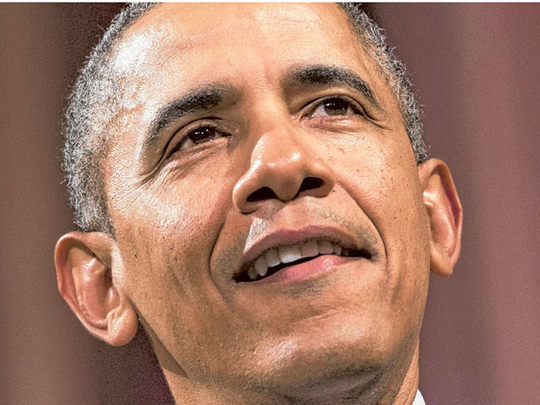
Rome/Riyadh: US President Barack Obama is making a fence-mending mission to Saudi Arabia, an important Middle East ally that’s grown nervous as the US negotiates with Iran and pulls out troops from Iraq and Afghanistan.
Obama left on Friday for an overnight trip to Saudi Arabia that has only two items on its public schedule: a meeting and a dinner with King Abdullah at his desert camp, and a 30-minute helicopter ride from the capital Riyadh.
Secretary of State John Kerry was travelling with Obama for what will be the president’s third official meeting with the king in six years.
White House officials and Middle East experts say the Saudi ruling family’s main concern is Iran. They fear Iran’s nuclear programme, object to Iran’s backing of the Bashar Al Assad regime in Syria and see the government of Tehran as having designs on oil fields in Saudi Arabia and Bahrain.
White House deputy national security adviser Ben Rhodes identified the points of anxiety in the relationship when he described Obama’s agenda for the trip last week as: “Our ongoing support for Gulf security, our support for the Syrian opposition where we’ve been very coordinated with the Saudis, the ongoing Middle East peace discussions, as well as both the nuclear negotiations with Iran but also our joint concern for destabilising actions that Iran is taking across the region.”
Saudi-US relations, dating back seven decades, are “tense due to Washington’s stances” on the Middle East, especially Iran, said Saudi analyst Abdul Aziz Al Saqr, who heads the Gulf Research Centre.
The recent rapprochement between Tehran and Washington “must not take place at the expense of relations with Riyadh”, Saqr said.
Saudi Arabia, long wary of Iran’s regional ambitions, views the November deal with Iran as a risky venture that could embolden Tehran.
The interim agreement curbs Iran’s controversial nuclear activities in exchange for limited sanctions relief, and is aimed at buying time to negotiate a comprehensive accord.
Saqr said “arming the Syrian opposition will top the agenda” during Obama’s visit, his second since his election in 2009.
Analyst Khalid Al Dakhil spoke of “major differences” with Washington, adding that Obama will focus on easing “Saudi fears on Iran and on regional security”.
The Saudi anxieties have been building over time, according to Simon Henderson, a fellow at The Washington Institute, a think tank focused on Middle East policy.
“Ever since Washington withdrew support for President [Hosni] Mubarak of Egypt in 2011, Abdullah and other Gulf leaders have worried about the reliability of Washington’s posture toward even long-standing allies,” Henderson wrote this week.
Saudi Arabia, which leads the six-nation Gulf Cooperation Council, fears that a US withdrawal from the Middle East and a diplomatic overture towards Iran would further feed Tehran’s regional ambitions.
Iranian-Saudi rivalry crystallised with the Syrian conflict: Tehran backs President Bashar Al Assad’s regime and several GCC states support the rebellion against him.
Obama’s stances towards events reshaping the region “have strained (Saudi-US) relations but without causing a complete break,” said Anwar Eshki, head of the Jeddah-based Middle East Centre for Strategic and Legal Studies.
US security and energy specialist professor Paul Sullivan said Obama meeting King Abdullah could “help clear the air on some misunderstandings”.
“However, I would be quite surprised if there were any major policy changes during this visit. This is also partly a reassurance visit,” he added.
White House spokesman Jay Carney has said that “whatever differences we may have do not alter the fact that this is a very important and close partnership”.
However, Riyadh seems to be reaching out more towards Asia, including China, in an apparent bid to rebalance its international relations.
Crown Prince Salman Bin Abdul Aziz this month visited China, Pakistan, Japan and India, to reportedly “strengthen ties”.
The US-Saudi relationship dates to the end of World War II and was founded on an agreement for Washington to defend the Gulf state in exchange for oil contracts.
Opec kingpin Saudi Arabia is the world’s top producer and exporter of oil.
Obama and the king are also expected to discuss deadlocked US-brokered Israeli-Palestinian peace talks.
They will also discuss Egypt, another bone of contention since the 2011 uprising, which ousted Hosni Mubarak, a staunch US and Saudi ally.
The kingdom was dismayed by the partial freezing of US aid to Egypt, whose army toppled Islamist president Mohammad Mursi in July — a move hailed by Riyadh.
Egypt’s Field Marshal Abdul Fattah Al Sissi resigned as defence minister on Thursday after announcing he would stand for president.
Dozens of US lawmakers in a letter to Obama have also urged him to publicly address Saudi Arabia’s “systematic human rights violations”, including efforts by women activists to challenge its ban on women drivers.








